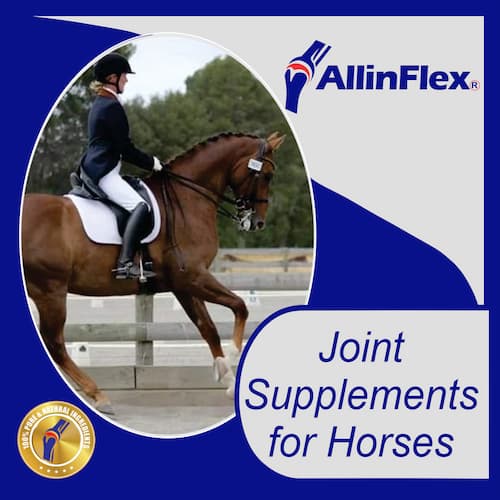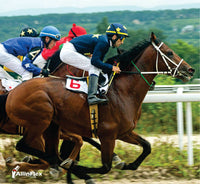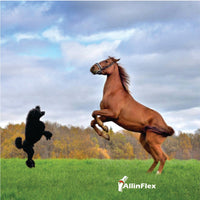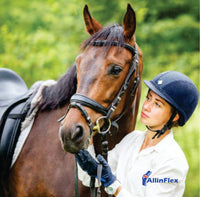How to protect my horse's joints when riding on hard grounds?
Saskia OstermeierThe well-being of a horse is of paramount importance to any horse owner, particularly for those involved in competitive equestrian sports.
These majestic creatures are often subjected to a wide variety of environments, with their feet taking the brunt of different terrain conditions. Among these, hard grounds pose a distinctive set of challenges.
When we talk about hard ground, we refer to compacted, unyielding surfaces which, whilst offering excellent traction, could potentially lead to certain health issues in horses, most notably within their joints.
Importance of Protecting Horse's Joints When Competing on Hard Grounds
Protecting a horse’s joints when competing on hard grounds is critically important for a multitude of reasons. The joint health of a horse directly impacts their comfort, mobility, performance, and overall longevity.
It is an unfortunate truth that many horses, especially those competing, suffer from joint problems at some point in their lives. Hard ground can exacerbate these problems due to the excessive concussive forces exerted on the joints, potentially leading to conditions like lameness or foot soreness.

Understanding the Ground Conditions
The terrain under a horse's hooves can vary significantly, ranging from soft and yielding like a sandy beach, to hard and unyielding like a paved road. Different ground conditions present different challenges and benefits.
For example, a soft, muddy ground can lead to a risk of slipping and sliding, while at the same time it might be easier on the horse's joints due to its shock-absorbing properties.
On the other hand, a solid, hard ground provides excellent traction, but without the same shock-absorbing qualities, it can potentially place a lot of stress on a horse's joints.
Hard ground, by definition, refers to compacted, firm surfaces with little to no give.
This can include anything from a dry, baked clay track to concrete pavements. The hardness of the ground is an issue for horses primarily because of the increased concussion, or shock, transmitted up the horse's leg each time their hoof hits the ground.
Unlike softer terrains that absorb a portion of this impact, hard ground reflects the majority of this force back into the horse's leg.
In terms of a horse's capacity to walk on hard surfaces, the answer is yes, they can.
Horses, like many creatures, are highly adaptable and can handle a wide range of ground conditions. That said, frequent or prolonged exposure to hard surfaces, particularly at high speeds or during intense activities like competition, can lead to stress and wear on the joints.
Potential Problems of Riding on Hard Ground
Hard ground presents a unique set of challenges for horses and their riders. The issues arising from riding on hard ground primarily stem from the lack of shock-absorption these surfaces offer.
Each time a horse's hoof strikes the ground, a shock wave is sent up the leg, a force that needs to be absorbed to prevent injury. Softer ground naturally absorbs a portion of this shock, but on hard ground, the majority of this force is reflected back up the horse's leg.
This additional stress can lead to a number of problems, including joint pain, bone damage, and tendon or ligament injuries.
It would be an oversimplification to categorically state that hard ground is bad for horses. Horses can indeed traverse hard surfaces without immediate harm.
However, consistent, high-intensity activity or competition on hard ground without adequate precautions may pose significant health risks over time. Hence, it's important to monitor your horse's reaction to these surfaces and provide the necessary care and precautions.
One of the serious concerns about hard ground is the potential for it to cause lameness in horses.
Lameness, a disruption in the normal gait of the horse, can be caused by a variety of factors. In the context of hard ground, the constant, intense concussive forces can lead to conditions like bone bruising, joint inflammation, or tendon and ligament strain, which, in turn, can result in lameness.
Lastly, if your horse is experiencing foot soreness after being on hard ground, it might be a sign of concussion-related issues.
The repeated impact on the hard surface can make the horse's feet tender. This could be due to bruising on the hoof, stress fractures, or the beginnings of a condition known as navicular syndrome.
If your horse shows signs of foot soreness, it's crucial to consult with a vet or a professional farrier to identify the root cause and ensure the proper treatment and care.
Evaluating the Need to Compete on Hard Ground
Whether or not to compete on hard ground is a decision that should be carefully considered, taking into account both the potential benefits and drawbacks. On one hand, hard ground can offer excellent traction, allowing for precise movements and potentially enhanced performance.
However, the downside is the excessive stress it places on the horse's joints, potentially leading to injuries over time.
There may be instances where competing on hard ground becomes a necessity.
For instance, in certain competitions where the terrain can't be altered, or in events that specifically require hard ground. In such cases, horse owners and riders need to be extra vigilant and take all necessary precautions to minimise the risk of joint damage or other related injuries.
Persistent competition on hard ground can have serious consequences for a horse's health and performance.
Continuous exposure to the harsh concussive forces of hard ground can lead to a higher risk of developing conditions like joint inflammation, tendon and ligament injuries, and even bone damage.
This could ultimately result in reduced performance, chronic pain, and in serious cases, the early retirement of the horse from competitive events.
Therefore, it's vital to be mindful of the frequency and intensity of competitions on hard ground, and to ensure appropriate measures are taken to protect the horse's health.
Effective Strategies to Protect Horses' Joints on Hard Ground
Hoof care is the first line of defence against the impact of hard ground. Employing a skilled farrier is paramount. They will be able to properly trim and shape the horse's hooves to ensure that weight distribution and alignment are optimal.
This not only aids in the prevention of unnecessary strain on the joints but also helps to avoid a host of other potential hoof problems.
Keeping the horse's hooves oiled can help to maintain the right level of moisture, thereby preventing them from becoming brittle and prone to cracking.
Regular application of a quality hoof oil or conditioner is advisable.
The use of hoof pads with packing can also be highly beneficial. These pads can provide additional shock absorption, reducing the impact of hard ground on the horse's legs.
They are inserted between the horse's hoof and the shoe and can be particularly useful in high-impact activities such as competition.

Boots and bandages are another means of protecting your horse's joints.
They offer external support and can help to reduce the risk of injury. There are many types available, so it's important to choose the right ones for your horse and the specific conditions.
Always ensure they are correctly fitted and used properly to avoid causing discomfort or impeding circulation.
Joint nutrition plays a pivotal role in maintaining joint health.
A balanced diet, rich in Omega-3 fatty acids, glucosamine, chondroitin sulphate, and hyaluronic acid can support joint health by reducing inflammation and supporting cartilage health. Consult with a vet or an equine nutritionist to create an appropriate feeding plan for your horse.
Cooling down practices after a workout are crucial to help reduce inflammation and aid recovery.
This could include hosing down the legs after a workout. This not only helps to remove dirt and sweat but also cools down the tissues, reducing inflammation and promoting recovery.
Consistent practice of this simple, yet effective, technique can significantly benefit your horse's joint health in the long term.
Alongside the above-mentioned strategies, limiting strenuous exercise on hard ground is an important precaution.
The less exposure your horse has to hard surfaces, particularly at high speeds or intense activity levels, the less likely they are to experience joint stress or injury.
Where possible, opt for softer surfaces for high-intensity workouts or use protective gear such as boots or hoof pads if hard ground is unavoidable.
Regular vet checks are also crucial in maintaining your horse's joint health.
A vet can spot early signs of joint stress or injury that may not be immediately visible to even the most attentive horse owner. Furthermore, you should always monitor your horse for signs of discomfort.
If your horse appears stiff, unwilling to move, or shows signs of pain when moving, it may indicate a joint issue.
Knowing when to seek professional help is key.
If you've implemented the recommended strategies and your horse is still showing signs of joint discomfort, it's time to seek professional advice.
This could be from a vet, a professional farrier, or an equine physiotherapist, depending on the symptoms and the potential cause of the discomfort.
While hard ground presents a unique set of challenges for horse's joints, these challenges can be successfully managed with the right strategies and precautions.
Good hoof care, appropriate protective gear, and a balanced diet can go a long way in protecting your horse's joints. Regular vet checks and attentive monitoring are crucial in detecting any potential issues early and seeking professional help when needed.
Maintaining the health of a horse's joints when competing on hard ground is an ongoing commitment.
It requires a proactive approach, and an understanding that every measure taken, no matter how small, contributes to the overall wellbeing and performance of your horse.
Your horse's joint health not only affects their performance but also their quality of life, making it a priority in their care.



